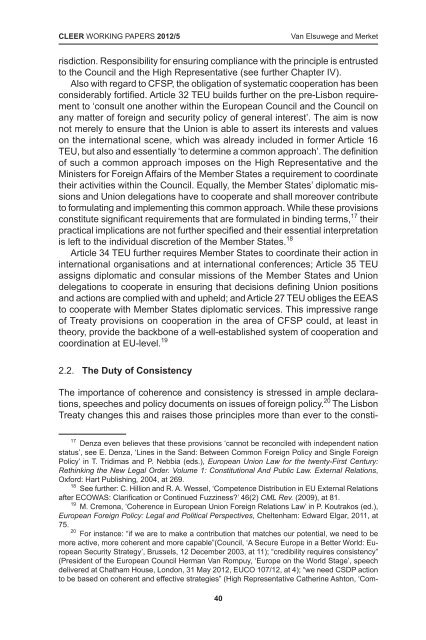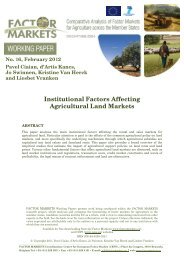CLEER WORKING PAPERS 2012/5Van Elsuwege <strong>and</strong> Merketrisdiction. Responsibility for ensuring compliance with the principle is entrustedto the Council <strong>and</strong> the High Representative (see further Chapter IV).Also with regard to CFSP, the obligation <strong>of</strong> systematic cooperation has beenconsiderably fortified. Article 32 T<strong>EU</strong> builds further on the pre-Lisbon requirementto ‘consult one another within the European Council <strong>and</strong> the Council onany matter <strong>of</strong> foreign <strong>and</strong> security policy <strong>of</strong> general interest’. The aim is nownot merely to ensure that the Union is able to assert its interests <strong>and</strong> valueson the international scene, which was already included in former Article 16T<strong>EU</strong>, but also <strong>and</strong> essentially ‘to determine a common approach’. The definition<strong>of</strong> such a common approach imposes on the High Representative <strong>and</strong> theMinisters for Foreign Affairs <strong>of</strong> the Member States a requirement to coordinatetheir activities within the Council. Equally, the Member States’ diplomatic missions<strong>and</strong> Union delegations have to cooperate <strong>and</strong> shall moreover contributeto formulating <strong>and</strong> implementing this common approach. While these provisionsconstitute significant requirements that are formulated in binding terms, 17 theirpractical implications are not further specified <strong>and</strong> their essential interpretationis left to the individual discretion <strong>of</strong> the Member States. 18Article 34 T<strong>EU</strong> further requires Member States to coordinate their action ininternational organisations <strong>and</strong> at international conferences; Article 35 T<strong>EU</strong>assigns diplomatic <strong>and</strong> consular missions <strong>of</strong> the Member States <strong>and</strong> Uniondelegations to cooperate in ensuring that decisions defining Union positions<strong>and</strong> actions are complied with <strong>and</strong> upheld; <strong>and</strong> Article 27 T<strong>EU</strong> obliges the EEASto cooperate with Member States diplomatic services. This impressive range<strong>of</strong> Treaty provisions on cooperation in the area <strong>of</strong> CFSP could, at least intheory, provide the backbone <strong>of</strong> a well-established system <strong>of</strong> cooperation <strong>and</strong>coordination at <strong>EU</strong>-level. 192.2. The Duty <strong>of</strong> ConsistencyThe importance <strong>of</strong> coherence <strong>and</strong> consistency is stressed in ample declarations,speeches <strong>and</strong> policy documents on issues <strong>of</strong> foreign policy. 20 The LisbonTreaty changes this <strong>and</strong> raises those principles more than ever to the consti-17 Denza even believes that these provisions ‘cannot be reconciled with independent nationstatus’, see E. Denza, ‘Lines in the S<strong>and</strong>: Between Common Foreign Policy <strong>and</strong> Single ForeignPolicy’ in T. Tridimas <strong>and</strong> P. Nebbia (eds.), European Union Law for the twenty-First Century:Rethinking the New Legal Order. Volume 1: Constitutional And Public Law. External Relations,Oxford: Hart Publishing, 2004, at 269.18 See further: C. Hillion <strong>and</strong> R. A. Wessel, ‘Competence Distribution in <strong>EU</strong> External Relationsafter ECOWAS: Clarification or Continued Fuzziness?’ 46(2) CML Rev. (2009), at 81.19 M. Cremona, ‘Coherence in European Union Foreign Relations Law’ in P. Koutrakos (ed.),European Foreign Policy: Legal <strong>and</strong> Political Perspectives, Cheltenham: Edward Elgar, 2011, at75.20 For instance: “if we are to make a contribution that matches our potential, we need to bemore active, more coherent <strong>and</strong> more capable”(Council, ‘A Secure Europe in a Better World: EuropeanSecurity Strategy’, Brussels, 12 December 2003, at 11); “credibility requires consistency”(President <strong>of</strong> the European Council Herman Van Rompuy, ‘Europe on the World Stage’, speechdelivered at Chatham House, London, 31 May 2012, <strong>EU</strong>CO 107/12, at 4); “we need CSDP actionto be based on coherent <strong>and</strong> effective strategies” (High Representative Catherine Ashton, ‘Com-40
The role <strong>of</strong> the Court <strong>of</strong> Justice in ensuring the unity <strong>of</strong> the <strong>EU</strong>’s <strong>external</strong> <strong>representation</strong>tutional level. Former Article 3 T<strong>EU</strong> has been dissected <strong>and</strong> dispersed over anumber <strong>of</strong> new Lisbon provisions. 21 Article 13 T<strong>EU</strong> echoes the idea that theinstitutional framework shall ‘ensure the consistency, effectiveness <strong>and</strong> continuity<strong>of</strong> its policies <strong>and</strong> actions’. In the light <strong>of</strong> the amalgamation <strong>of</strong> the Communitywith the Union, the new Article omits the requirement that this has to respect<strong>and</strong> build upon the acquis communautaire. Article 7 TF<strong>EU</strong> adds that the ‘Unionshall ensure consistency between its policies <strong>and</strong> activities” <strong>and</strong> balances thiswith the principle <strong>of</strong> conferred powers. Such a general unambiguous duty <strong>of</strong>consistency <strong>of</strong> all Union action does not have a predecessor under the previousTreaty regime. Article 21(3)T<strong>EU</strong> replicates the second paragraph <strong>of</strong> formerArticle 3 T<strong>EU</strong> <strong>and</strong> requires the Union to ‘ensure consistency between the differentareas <strong>of</strong> its <strong>external</strong> action <strong>and</strong> between these <strong>and</strong> its other policies’.Besides scattering the provisions on the duty <strong>of</strong> consistency, the LisbonTreaty also diffuses responsibility over its execution. Article 21(3) T<strong>EU</strong> statesthat the ‘Council <strong>and</strong> the Commission, assisted by the [High Representative],shall ensure that consistency <strong>and</strong> shall cooperate to that effect’. Quite confusingly,while this article places the High Representative in a supporting role,Article 18(4) T<strong>EU</strong> seems to make the latter, in his/her capacity as Vice-President<strong>of</strong> the Commission, the sole responsible for ensuring <strong>external</strong> action consistency.Be that as it may, the High Representative is assisted by the EuropeanExternal Action Service in fulfilling his/her m<strong>and</strong>ate ‘to ensure the consistency<strong>of</strong> the Union’s <strong>external</strong> action’. 22 Further, Article 16(6) T<strong>EU</strong> assigns a centralfunction to the General Affairs Council to ‘ensure consistency in the work <strong>of</strong> thedifferent Council configurations’ <strong>and</strong> bestows the Foreign Affairs Council (FAC)with the responsibility <strong>of</strong> elaborating the Union’s <strong>external</strong> action <strong>and</strong> ensuringthat it is consistent.While the reorganisation <strong>of</strong> provisions <strong>and</strong> political responsibility may seemto obscure the legal basis <strong>of</strong> the duty <strong>and</strong> assign it a less prominent position, 23the Lisbon Treaty essentially confirms consistency between the various <strong>EU</strong>policies <strong>and</strong> actions as one <strong>of</strong> its central threads. 24 First <strong>of</strong> all, the new T<strong>EU</strong>assembles all the Union’s <strong>external</strong> action principles <strong>and</strong> objectives in a singleArticle 21 <strong>and</strong> provides that these shall be respected <strong>and</strong> pursued in all thedifferent areas <strong>of</strong> the Union’s <strong>external</strong> action, as well as in the <strong>external</strong> aspects<strong>of</strong> its other policies. Article 24(2) T<strong>EU</strong> <strong>and</strong> 205 TF<strong>EU</strong> confirm that both CFSP<strong>and</strong> TF<strong>EU</strong> <strong>external</strong> policies shall be conducted within this general framework<strong>of</strong> Article 21 T<strong>EU</strong>. 25 Moreover, Title II <strong>of</strong> Part One on the <strong>Principles</strong> <strong>of</strong> the TF<strong>EU</strong>mon Security <strong>and</strong> Defence Policy’, speech delivered to the European Parliament, Strasbourg, 13December 2011, A 512/11, at 1).21 For an analysis <strong>of</strong> former Article 3 T<strong>EU</strong>, see: I. Bosse-Platière, L’article 3 T<strong>EU</strong>. Recherchesur une exigence de coherence de l’action extérieure de l’Union européenne, Bruxelles: Bruylant,2009.22 Council Decision (2010/427/<strong>EU</strong>) <strong>of</strong> 26 July 2010 establishing the organisation <strong>and</strong> functioning<strong>of</strong> the European External Action Service, OJ L201/30, 3.8.2010 (further: ‘EEAS Decision’),Article 2(1).23 P. Eeckhout, <strong>EU</strong> External Relations Law, Oxford: Oxford University Press, 2011, at 186.24 M. Cremona, ‘Coherence through Law: What difference will the Treaty <strong>of</strong> Lisbon make?’3(1) Hamburg Review <strong>of</strong> Social Sciences (2008), at 30.25 See also: 207(1), 208(1), 212(1) <strong>and</strong> 214(1) TF<strong>EU</strong>.41CLEER WORKING PAPERS 2012/5
- Page 1: Founded in 2008, the Centre for the
- Page 4 and 5: CLEER WORKING PAPERS 2012/5Gosalbo
- Page 6 and 7: CLEER WORKING PAPERS 2012/5Gosalbo
- Page 8 and 9: CLEER WORKING PAPERS 2012/5Gosalbo
- Page 10 and 11: CLEER WORKING PAPERS 2012/5Blockman
- Page 12 and 13: CLEER WORKING PAPERS 2012/5Blockman
- Page 14 and 15: CLEER WORKING PAPERS 2012/5Casolari
- Page 16 and 17: CLEER WORKING PAPERS 2012/5Casolari
- Page 18 and 19: CLEER WORKING PAPERS 2012/5Casolari
- Page 20 and 21: CLEER WORKING PAPERS 2012/5Casolari
- Page 22 and 23: CLEER WORKING PAPERS 2012/5Casolari
- Page 24 and 25: CLEER WORKING PAPERS 2012/5Casolari
- Page 26 and 27: CLEER WORKING PAPERS 2012/5Casolari
- Page 28 and 29: CLEER WORKING PAPERS 2012/5Casolari
- Page 30 and 31: CLEER WORKING PAPERS 2012/5Casolari
- Page 32 and 33: CLEER WORKING PAPERS 2012/5Casolari
- Page 34 and 35: CLEER WORKING PAPERS 2012/5Casolari
- Page 36 and 37: CLEER WORKING PAPERS 2012/5Casolari
- Page 38 and 39: CLEER WORKING PAPERS 2012/5Casolari
- Page 40 and 41: CLEER WORKING PAPERS 2012/5Van Elsu
- Page 44 and 45: CLEER WORKING PAPERS 2012/5Van Elsu
- Page 46 and 47: CLEER WORKING PAPERS 2012/5Van Elsu
- Page 48 and 49: CLEER WORKING PAPERS 2012/5Van Elsu
- Page 50 and 51: CLEER WORKING PAPERS 2012/5Van Elsu
- Page 52 and 53: CLEER WORKING PAPERS 2012/5Van Elsu
- Page 54 and 55: CLEER WORKING PAPERS 2012/5Van Elsu
- Page 56 and 57: CLEER WORKING PAPERS 2012/5Van Elsu
- Page 58 and 59: CLEER WORKING PAPERS 2012/5Van Elsu
- Page 60 and 61: CLEER WORKING PAPERS 2012/5Van Elsu
- Page 62 and 63: CLEER WORKING PAPERS 2012/5Van Voor
- Page 64 and 65: CLEER WORKING PAPERS 2012/5Van Voor
- Page 66 and 67: CLEER WORKING PAPERS 2012/5Van Voor
- Page 68 and 69: CLEER WORKING PAPERS 2012/5Van Voor
- Page 70 and 71: CLEER WORKING PAPERS 2012/5Van Voor
- Page 72 and 73: CLEER WORKING PAPERS 2012/5Van Voor
- Page 74 and 75: CLEER WORKING PAPERS 2012/5Van Voor
- Page 76 and 77: CLEER WORKING PAPERS 2012/5Van Voor
- Page 78 and 79: CLEER WORKING PAPERS 2012/5Van Voor
- Page 80 and 81: CLEER WORKING PAPERS 2012/5Van Voor
- Page 82 and 83: CLEER WORKING PAPERS 2012/5Van Voor
- Page 84 and 85: CLEER WORKING PAPERS 2012/5Van Voor
- Page 86 and 87: CLEER WORKING PAPERS 2012/5McArdle
- Page 88 and 89: CLEER WORKING PAPERS 2012/5McArdle
- Page 90 and 91: CLEER WORKING PAPERS 2012/5McArdle
- Page 92 and 93:
CLEER WORKING PAPERS 2012/5McArdle
- Page 94 and 95:
CLEER WORKING PAPERS 2012/5McArdle
- Page 96 and 97:
CLEER WORKING PAPERS 2012/5McArdle
- Page 98 and 99:
CLEER WORKING PAPERS 2012/5McArdle
- Page 100 and 101:
CLEER WORKING PAPERS 2012/5McArdle
- Page 102 and 103:
CLEER WORKING PAPERS 2012/5McArdle
- Page 104 and 105:
CLEER WORKING PAPERS 2012/5McArdle
- Page 106 and 107:
CLEER WORKING PAPERS 2012/5Eckeswit
- Page 108 and 109:
CLEER WORKING PAPERS 2012/5Eckesdro
- Page 110 and 111:
CLEER WORKING PAPERS 2012/5Eckesto
- Page 112 and 113:
CLEER WORKING PAPERS 2012/5Eckesare
- Page 114 and 115:
CLEER WORKING PAPERS 2012/5EckesEU
- Page 116 and 117:
CLEER WORKING PAPERS 2012/5Eckeswil
- Page 118 and 119:
CLEER WORKING PAPERS 2012/5EckesPar
- Page 120 and 121:
CLEER WORKING PAPERS 2012/5Eckesthe
- Page 122 and 123:
CLEER WORKING PAPERS 2012/5Eckesise
- Page 124 and 125:
CLEER WORKING PAPERS 2012/5Eckesand
- Page 126 and 127:
CLEER WORKING PAPERS 2012/5Eckesto
- Page 128 and 129:
CLEER WORKING PAPERS 2012/5Eckesarg
- Page 130 and 131:
CLEER WORKING PAPERS 2012/5Wouters,
- Page 132 and 133:
CLEER WORKING PAPERS 2012/5Wouters,
- Page 134 and 135:
CLEER WORKING PAPERS 2012/5Wouters,
- Page 136 and 137:
CLEER WORKING PAPERS 2012/5Wouters,
- Page 138 and 139:
CLEER WORKING PAPERS 2012/5Wouters,
- Page 140 and 141:
CLEER WORKING PAPERS 2012/5Wouters,
- Page 142 and 143:
CLEER WORKING PAPERS 2012/5Wouters,
- Page 144 and 145:
CLEER WORKING PAPERS 2012/5Wouters,
- Page 146:
CLEER WORKING PAPERS 2012/5Wouters,








